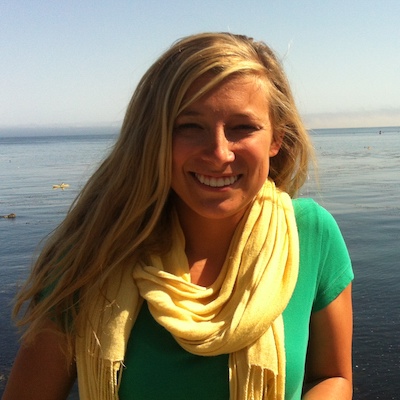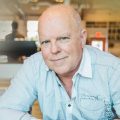Connecting the Dots to a Dream Job in the Hemp Industry
This is a reader profile. (Read others or nominate someone to be featured.)
Annie Rouse has been passionate about hemp ever since she was a kid growing up in Kentucky. While she knew she wanted to help change the restrictive hemp policies in the U.S., she’s also had some interesting jobs along the way that helped her out in surprising ways.
As a leader in the hemp industry she has now started a hemp foundation, a certification program, and a commercial marketplace.
Here’s her story:
My job history is like that Steve Jobs quote “You can’t connect the dots looking forward; you can only connect them looking backwards.” While giving out free beer, designing sunglasses and monitoring water quality didn’t seem connected at the time, now I can look back and see how all the different jobs have helped get me where I am now.

Exploring hemp fields in Canada
Starting out
In college I worked for Budweiser, giving out beers and playing games with people in bars. While it might not seem at all productive, that job helped me gain a lot of confidence with public speaking and talking to strangers. Also during college, I worked for the study abroad department at my university which peaked my interest in international travel and markets. My first real hemp related job with The Kentucky Hemp Initiative gave me a crash course in the importance of networking.
Shortly after college, I ended up starting my own company designing, contract manufacturing, and marketing specialty sunglasses. Again, while it’s not directly related to hemp, the process of creating my own company and managing all aspects of the business made me realize I wanted to pursue my MBA. So I went back to university.

Grad school to Fulbright
While in graduate school, I took advantage of every opportunity I could, including interning for the Monterey Bay Aquarium doing a LEED feasibility study. At the time, I thought that I might like to be a green building consultant, performing audits on LEED buildings. Turns out that experience would be invaluable later as I was starting my own third-party certification company.
My graduate school also supports students in applying for the Fulbright Scholarship, so once again I took advantage of the opportunity and applied to study hemp in Canada. I was accepted and studied the construction industry in Alberta, doing an environmental life cycle assessment of a biofiber hemp block in comparison to a concrete block. While hemp is touted as one of the most sustainable crops in the world, it is only as sustainable as producers make it. If you grow it or manufacture it in an unsustainable way then it’s no longer considered “green.” This was something I discovered during my research and later unfolded into a desire to re-establish the U.S. industry in the most sustainable way.

Hemp education
Taking time to lay the groundwork
This hyper-specific experience turned out to be invaluable when I got back to the States, because the Farm Bill had just been passed that allowed hemp to be grown at a research scale in the US. I was a year ahead of the curve and was able to immediately get involved with hemp production in Kentucky (the leader in the US).
I talked with growers and researchers and took about a year to figure out where I wanted to position myself in this growing industry. And equally important, I thought about what I was interested in, what I was good at and where I could actually earn a living.
I finally decided that the industry really needed a research foundation (for the long-term health of the industry), and a third-party certification program (since there was no quality assurance). So I decided to create both, plus a brokerage and marketplace in order to build industry demand.

Even the hemp industry can be challenging
The most challenging and redundant part of working with hemp is constantly explaining to people that hemp and marijuana are not the same thing. Since hemp has been regulated for the past 70 years as a controlled substance there’s a lot of education that still needs to happen. I’ve lost count of how many times I’ve had to tell someone that you can’t get high from hemp.

Spreading the hemp love to Peru
Hemp and non-hemp advice
For anyone interested in the industry in the US, Kentucky has historically been the hemp capital, so it’s a great place to get involved. Colorado now has lots of opportunities for commercialization of CBD and other states are pushing forward with their hemp pilot programs. Although it is still challenging to find a paying position in the industry because of all the regulations and the relative size.
Globally though, there are more opportunities. Canada dominates the market for health food, including hemp hearts, oil, and protein. China is the leader in hemp textiles, while Europe leads the way in biocomposites. These regions have fostered hemp commercialization since the mid-90s, and China never made it illegal. So really, the U.S. is just starting to compete with these countries, but it’s not even produced at a commercial scale yet.
While not everyone is as obsessed with hemp as I am, I think my path and lessons can benefit everyone.
First, every job can be of benefit to you even if it’s not directly applicable to your passion. Giving out free beer helped me become better at small talk and feel comfortable approaching strangers.
Second, connect the unconnected. By merging LEED certification and life cycle assessment, I was able to come up with a strong third-party certification system.
Last, immerse yourself in whatever industry you find intriguing—business, writing, travel—in whatever way you can. There are other people and groups out there that share your passions.
Learn more about Annie on Think Hempy Thoughts and follow her on Instagram @thinkhempythoughts.
###







